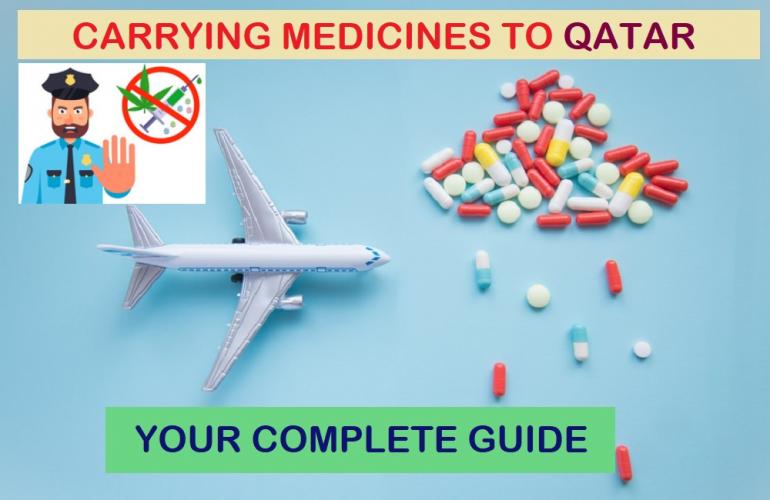Planning to carry medicines to Qatar but confused on what you can and cannot take with you here?
This blog will serve as your useful guide in checking the accredited and banned drugs, as well as the rules on medical possessions in the country.
If you are a Qatar expat, worker or traveler, here's what you need to know about carrying medicines to Qatar:
General Rule of Thumb
If you have been prescribed any medicines, bring the original copies of your doctor’s prescriptions along with the original product packaging so that the Qatar customs authorities can easily identify them.
It is also recommended to obtain a letter on official letterhead from your physician that lists the medicines you need and why they were prescribed.
These are basic rules applicable for all prescribed drugs, and you must follow if you intend to carry medicines to Qatar.
Are you currently working in Qatar? Read this helpful blog from a recruitment agency in Doha to avoid getting dismissed from your job due to legal violations:
Things Expats Must Avoid to Keep their Jobs in Qatar and Not Get Deported
Over-the-Counter Medicines
Qatar authorities keep an eye on some medicines that can be purchased over-the-counter in other countries as they produce effects that contravene local laws.
Top Tip: Make sure to bring prescriptions for these medicines, which you might assume to be harmless.
• Many common cold and cough remedies - Needed prescriptions
• Some sleeping tablets, painkillers, antidepressants and hormone replacement therapy drugs - Banned in Qatar
• Some controlled drugs including alfentanil, amphetamine, codeine, fentanyl, ketamine, methadone, methylphenidate and morphine - Controlled in Qatar
What’s not allowed?
The government of Qatar has imposed a strict rule regarding which medicines can be carried to here or not. Beware of the following medications when travelling to this country:
Medicines containing narcotics or psychotropic substances
• Alprazolam (Xanax)
• Clonazepam
• Codeine
• Diazepam (Valium)
• Lyrica
• Methadone
• Pregabalin
• Tramadol
• Valium
• Zolam
• Zolpidem
Find the complete list of restricted medicines here. This list may not be complete, but you can have a rough idea of what kind of pharmaceutical substances are banned in Qatar.
The Indian Embassy of Qatar also published a list of banned medicines in Qatar. To download, click this link.
NOTE: A circular from Qatar's Supreme Council of Health addressed to all embassies contains mandatory procedures and regulations to be followed by anyone carrying medicines containing drugs or psychotropic substances when coming to Qatar or departing from here for their personal use.
Here are the main points from the circular:
• It is prohibited to carry medicines and substances which are banned internationally and locally.
• It is also restricted to carry medicines mentioned in the list (a) and list (b) of Law (9) issued in the year 1987 regarding anti-drugs and dangerous psychotropic substances. Likewise, the items registered at schedule No. (3) of the same Law.
• In order to carry such medicines, an application must be submitted to the Department of Pharmacology and Drugs Control in the Supreme Council of Health
Many expats lose their jobs in Qatar due to illegal possession of prohibited drugs. The Ministry of Interior (MoI) warned anyone caught bringing restricted medicines on facing heavy penalties.
“Avoid bringing any suspicious substances or drugs, because some narcotic substances and medicines may be allowed to be used in your country, but they are prohibited in the State of Qatar.” - Ministry of Interior, General Directorate of Drug Enforcement
Can I still carry some of the banned medicines?
Yes. However, you need to send an application to the Department of Pharmacology and Drugs Control in the Supreme Council of Health to carry the restricted medicines legally.
Special Permission Grant
Worried about carrying medicines to Qatar? The good news is, there is a special provision through which you can take them with you.
Follow these steps to apply for a special provision for carrying medicines to this country:
STEP 1 - Choose between the two options below:
Option 1: Attach a medical report given by the hospital or the care provider.
Note: The document must not be older than six (6) months and must contain the following information:
• Patient information
• Medical diagnosis
• Treatment and duration
• Medical prescription
• The scientific name of medicines, forms and doses
Option 2: Attach a medical prescription granted by the care provider in the patient’s name. It must include:
• Diagnosis
• Seal of the hospital
• Duration of treatment and how to use
• The scientific name of medicines, forms and doses
STEP 2 - Attach a copy of the ID card of the patient
STEP 3 - Enclose a pledge that will state that the medicine will be used only by the patient.
Approval of Request
Approval can be granted to carry medicines of 30-days as the maximum period or for the duration of the patient’s stay in Qatar. Whatever is less, it will be subject to the validity of the medicines.
Here are the important points that the patient has to be aware of:
• If the medicine exhausts, the patient must contact the specialist physician licensed to practice in a hospital to check whether he needs to continue the same medicine.
• If the physician confirms that the patient needs to continue the same treatment, a specific medical file has to be opened in that hospital.
• The appropriate medicine shall be prescribed through a medical prescription attested by the same hospital.
• The medicine would be provided from the local pharmacy for the required period.
• The patient will continue to do follow-ups with the same hospital for his continuous treatment if his medical condition warrants.
What if the medicine or its alternative is not available in Qatar?
Suppose the medicine or its alternative is not available in Qatar local markets, the hospital treating the patient can secure this medicine through one of the drug distributors. But first, the patient has to obtain approval from the Department of Pharmacology and Drugs Control in the Supreme Council of Health.
Special Permission for Injection Medicines
Suppose the medicine is in the form of an injection. In that case, the approval can be obtained under the supervision of any local hospital in the patient's name.
The medicine would be registered in the hospital file for personal use as per the procedure for such medication.
The Department of Pharmacology and Drugs Control in the Supreme Council of the Health will destroy excess medicines.
Special Permission for Diplomats
The medicines containing drugs or psychotropic substances are to be carried by the diplomats or government officials (only) coming to Qatar for the patients working with the diplomatic mission. Here are the procedures to follow:
• The Mission has to send an application to the Department of Pharmacology and Drugs Control in the Supreme Council of Health, mentioning the head of the Mission or the custodian of the drugs. If not so, the accompanying physician would be the custodian of the medicine. The application should be attached with the following:
- Details of the desired medicines, certified by the concerned authority in the country of the Mission, including the scientific name of the drug and psychotropic substance, form, concentration, size and quantity.
- Medicines containing drugs and psychotropic substances have to be brought through aerial transportation only.
• To pledge that the medicines would be used by the members of the Mission/delegation only on their responsibility and will not sell or be utilised for any other purpose.
• To pledge that the excess medicines would be carried back and will destroy used bottles. To pledge to provide details of medicine utilization, reasons for utilisation, excess medicine and destroyed ones before the delegation’s departure to the Department of Drugs and Pharmacology Control in the Supreme Council of Health.
NOTE: Once the application is approved, permission would be granted for carrying the medicine.
Departing from Qatar
According to the paragraphs mentioned in the 'special permission grant' section above, departing patients from Qatar would be treated as par with one coming to Qatar. Quantity of medicine would be allowed for 30 days only.
If the patient’s medicine is not carried by one of his relatives (parents, children, brothers or spouse), a copy of his ID would be taken. In case the medicine was carried by the patient’s representative, the patient’s written consent for carrying medicine has to be attached. A copy of his ID would be taken.
Beware of What You Bring
If you often travel to Qatar and carry medicines with you, it is important to follow the rules and regulations set by the government regarding possession of medicines to avoid getting into trouble.
Remember: Medicines are essential, but they can cause you big trouble if you’re not careful.
Read more guidelines about Qatar Law from the No. 1 outsourcing service in Qatar — B2C Solutions.
For all your recruitment or employment needs, contact B2C today.






